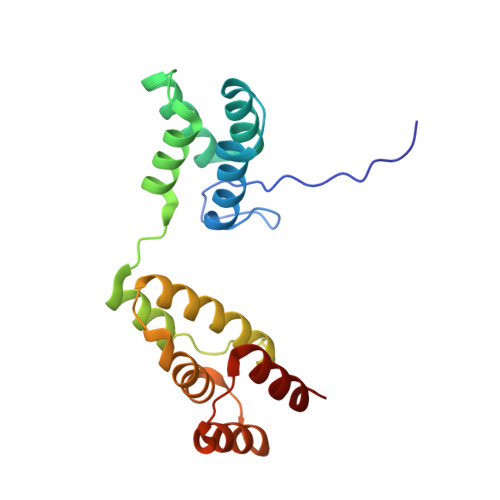PNMA2 forms immunogenic non-enveloped virus-like capsids associated with paraneoplastic neurological syndrome.
Xu, J., Erlendsson, S., Singh, M., Holling, G.A., Regier, M., Ibiricu, I., Einstein, J., Hantak, M.P., Day, G.S., Piquet, A.L., Smith, T.L., Clardy, S.L., Whiteley, A.M., Feschotte, C., Briggs, J.A.G., Shepherd, J.D.(2024) Cell 187: 831
- PubMed: 38301645
- DOI: https://doi.org/10.1016/j.cell.2024.01.009
- Primary Citation of Related Structures:
8RB3, 8RB4, 8RB5, 8RB7 - PubMed Abstract:
The paraneoplastic Ma antigen (PNMA) proteins are associated with cancer-induced paraneoplastic syndromes that present with an autoimmune response and neurological symptoms. Why PNMA proteins are associated with this severe autoimmune disease is unclear. PNMA genes are predominantly expressed in the central nervous system and are ectopically expressed in some tumors. We show that PNMA2, which has been co-opted from a Ty3 retrotransposon, encodes a protein that is released from cells as non-enveloped virus-like capsids. Recombinant PNMA2 capsids injected into mice induce autoantibodies that preferentially bind external "spike" PNMA2 capsid epitopes, whereas a capsid-assembly-defective PNMA2 protein is not immunogenic. PNMA2 autoantibodies in cerebrospinal fluid of patients with anti-Ma2 paraneoplastic disease show similar preferential binding to spike capsid epitopes. PNMA2 capsid-injected mice develop learning and memory deficits. These observations suggest that PNMA2 capsids act as an extracellular antigen, capable of generating an autoimmune response that results in neurological deficits.
Organizational Affiliation:
Department of Neurobiology, University of Utah, Salt Lake City, UT, USA.














